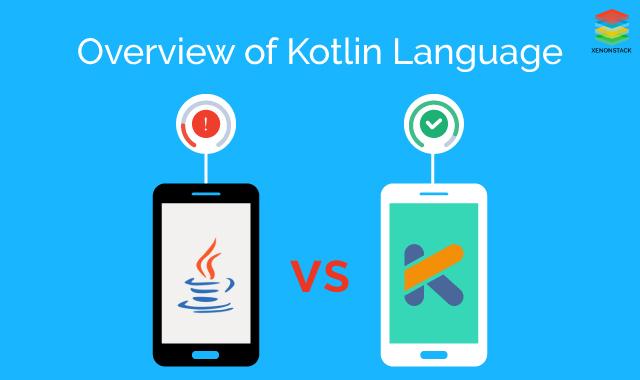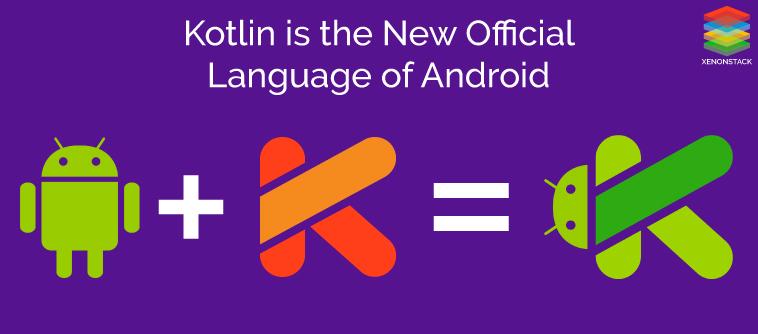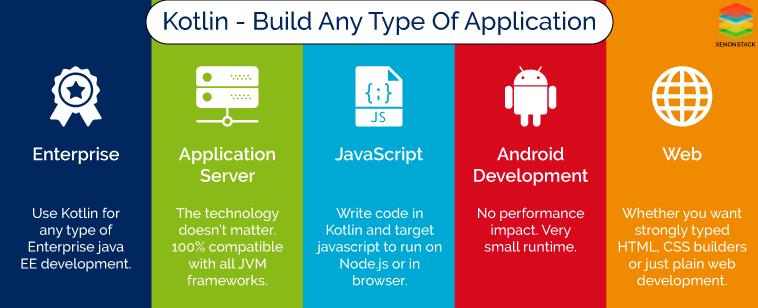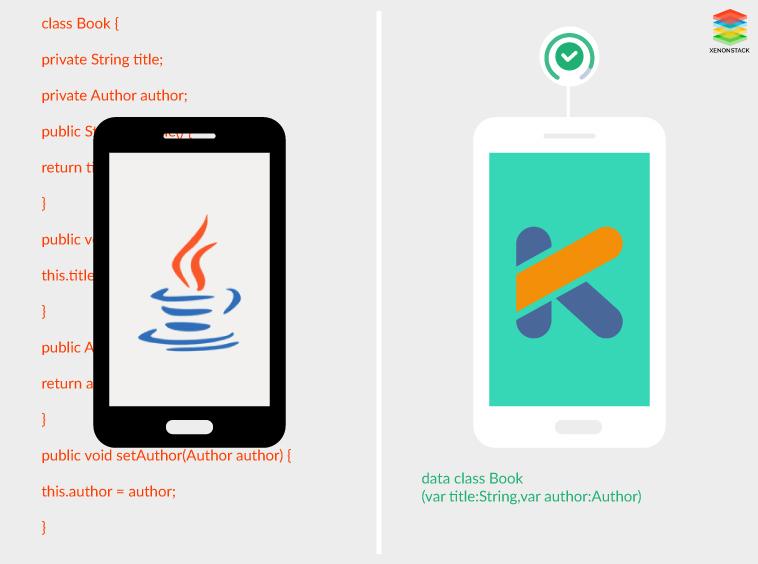Overview of Kotlin Language and Comparison Between Kotlin and Java
Bài đăng này đã không được cập nhật trong 4 năm

What is Kotlin Language?****
Kotlin is a new programming language from JetBrains. It first appeared in 2011 when JetBrains unveiled their project named “Kotlin”. Kotlin is an Open-Source Language.
Basically like Java, C and C++ - Kotlin is also “statically typed programming language”. Statically typed programming languages are those languages in which variables need not be defined before they are used. This means that static typing has to do with the explicit declaration or initialization of variables before they are employed.
As Earlier said that Java is an example of a statically typed language, similarly C and C++ are also statically typed languages.
Basically, Static typing does not mean that we have to declare all the variables first before we use them. Variables may be initialized anywhere in the program and we (developers) have to do so, to use those variables anywhere in the program when there is a need. Consider the following example -
/* Java Code */
static int num1, num2; //explicit declaration
num1 = 20; //use the variables anywhere
num2 = 30;
/* Kotlin Code*/
val a: Int
val b: Int
a=5
b=10
In addition to the classes and methods of object-oriented programming, Kotlin also supports procedural programming with the use of functions.
Like in Java, C and C++, the entry point to a Kotlin program is a function named “main”. Basically, it passed an array containing any command line arguments. Consider the following example -
/* Kotlin Code*/
/* Simple Hello Word Example*/
//optional package header
package hello
//package level function, which return Unit and takes an array of string as parameter
fun main(args: Array < String > ) {
val scope = “world”
println(“Hello, $scope!”) //semicolons are optional, have you noticed that? :)
}
Filename extensions of the Java are .java, .class, .jar but on the other hand filename extensions of the Kotlin are .kt and .kts.

On May 17, 2017 at the Google I/O keynote, the Android team announced that Kotlin will be the Official Language of Android. For More Info, Visit the Link.
Benefits of Kotlin Language****
-
Kotlin compiles to JVM bytecode or JavaScript - Like Java, Bytecode is the compiled format for Kotlin programs also. Bytecode means Programming code that, once compiled, is run through a virtual machine instead of the computer’s processor. By using this approach, source code can be run on any platform once it has been compiled and run through the virtual machine. Once a kotlin program has been converted to bytecode, it can be transferred across a network and executed by JVM(Java Virtual Machine).
-
Kotlin programs can use all existing Java Frameworks and Libraries - Yes, it's true that Kotlin programs can use all existing java frameworks and libraries, even advanced frameworks that rely on annotation processing. The main important thing about kotlin language is that it can easily integrate with Maven, Gradle and other build systems.
-
Kotlin can be learned easily and it is approachable. It can be learned easily by simply reading the language reference.The syntax is clean and intuitive(easy to use and understand). Kotlin looks a lot like Scala but is simpler.
-
Kotlin is Open Source and it costs nothing to adopt.
-
Automatic conversion of Java to Kotlin - JetBrains integrated a new feature into IntelliJ which converts Java to Kotlin and saves a huge amount of time. And it also saves us to retype mundane code.
-
Kotlin’s null-safety is great - Now get rid of NullPointerExceptions. This type of system helps us to avoid null pointer exceptions. In Kotlin the system simply refuses to compile code that tries to assign or return null. Consider the following example -
val name: String = null // tries to assign null, won’t compile.
fun getName() : String = null // tries to return null, won’t compile.
- Code reviews are not a problem - Kotlin is much more focuses on readable syntax so code reviews are not a problem, they can still be done by those team members who are not familiar with the language.
Features of Kotlin Language****
The billion dollar mistake made right. As already mentioned above that Kotlin avoids the null pointer exception. If we try to assign or return null to a variable or function respectively, then it won’t compile.
But in some special cases if we need nullability in our program then we have to ask Kotlin very nicely. Every Nullable type require some special care and treatment. We can’t treat them the same way as non-nullable types and this is a very good thing.
We have to add “?” after the variable type. Consider the following example - Kotlin also fails at compile-time whenever a NullPointerException may be thrown at run-time. Consider the following example -
val name: String? = null //assigned null and it will compile also.
fun getName() : String? = null //returned null and it will compile too.
/* won’t compile */
val name: String? = null
val len = name.length
/* correct way */
val name: String? = null
val len = name?.length
- **Versatile **

- Lean Syntax and Concise - One liner functions take one line, simple structs/JavaBeans can also be declared in one line. Real properties generate getters and setters behind the scenes for Java interop. And Adding the data annotation to a class triggers autogeneration of boilerplate like equals, hashCode, toString and much more.
Consider the following example -
/* Java program */
public class Address {
private String street;
private int streetNumber;
private String postCode;
private String city;
private Country country;
public Address(String street, int streetNumber, String postCode, String city, Country country) {
this.street = street;
this.streetNumber = streetNumber;
this.postCode = postCode;
this.city = city;
this.country = country;
}
@Override
public boolean equals(Object o) {
if (this == o) return true;
if (o == null || getClass() != o.getClass()) return false;
Address address = (Address) o;
if (streetNumber != address.streetNumber) return false;
if (!street.equals(address.street)) return false;
if (!postCode.equals(address.postCode)) return false;
if (!city.equals(address.city)) return false;
return country == address.country;
}
@Override
public int hashCode() {
int result = street.hashCode();
result = 31 * result + streetNumber;
result = 31 * result + postCode.hashCode();
result = 31 * result + city.hashCode();
result = 31 * result + (country != null ? country.hashCode() : 0);
return result;
}
@Override
public String toString() {
return "Address{" +
"street='" + street + '\'' +
", streetNumber=" + streetNumber +
", postCode='" + postCode + '\'' +
", city='" + city + '\'' +
", country=" + country +
'}';
}
public String getStreet() {
return street;
}
public void setStreet(String street) {
this.street = street;
}
public int getStreetNumber() {
return streetNumber;
}
public void setStreetNumber(int streetNumber) {
this.streetNumber = streetNumber;
}
public String getPostCode() {
return postCode;
}
public void setPostCode(String postCode) {
this.postCode = postCode;
}
public String getCity() {
return city;
}
public void setCity(String city) {
this.city = city;
}
public Country getCountry() {
return country;
}
public void setCountry(Country country) {
this.country = country;
}
}
/* Kotlin Program */
data class Address(var street:String,
var streetNumber:Int,
var postCode:String,
var city:String,
var country:Country)
Difference Between Kotlin And Java

Continue Reading The Full Article At - XenonStack.com/Blog
All rights reserved